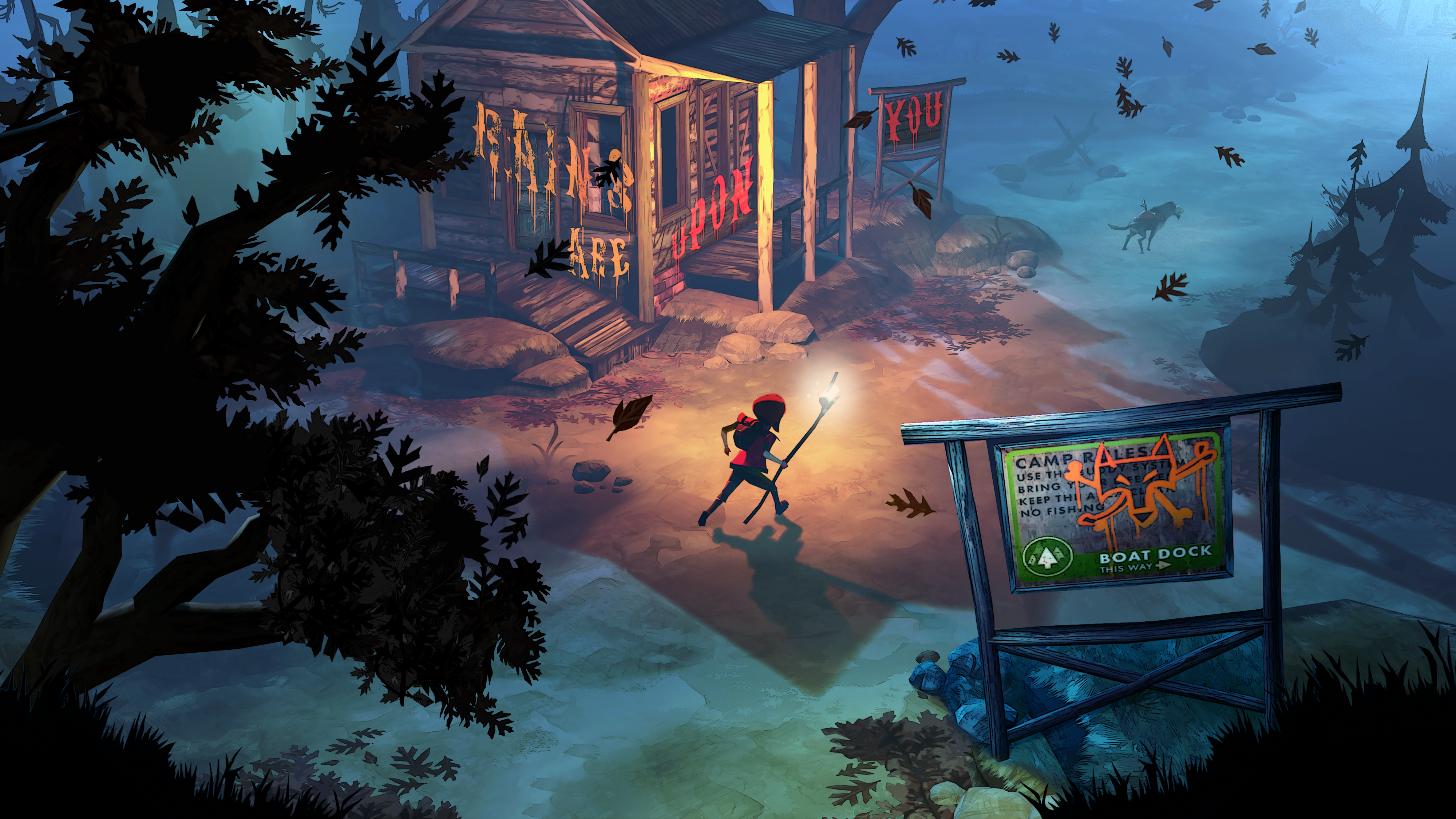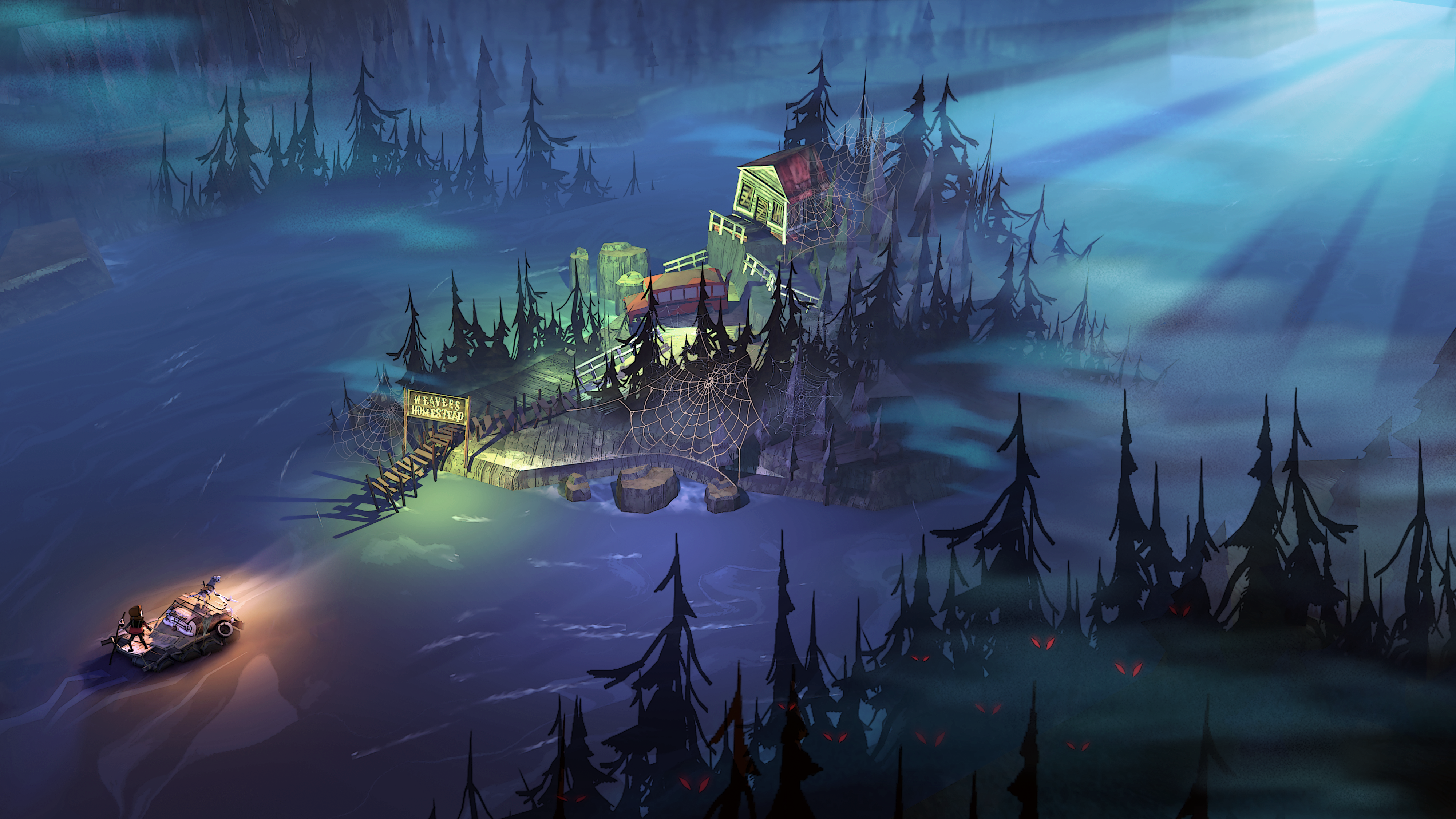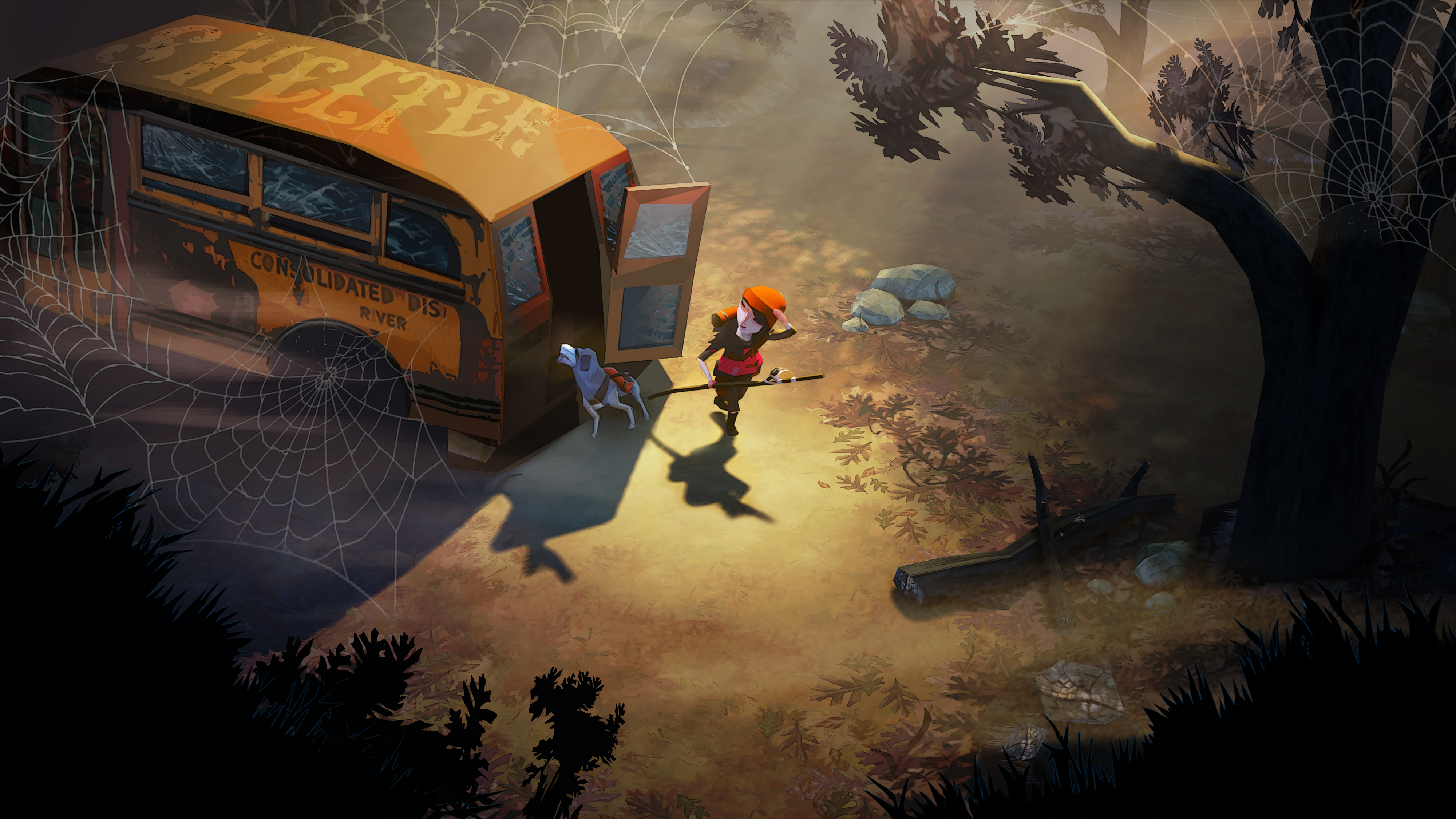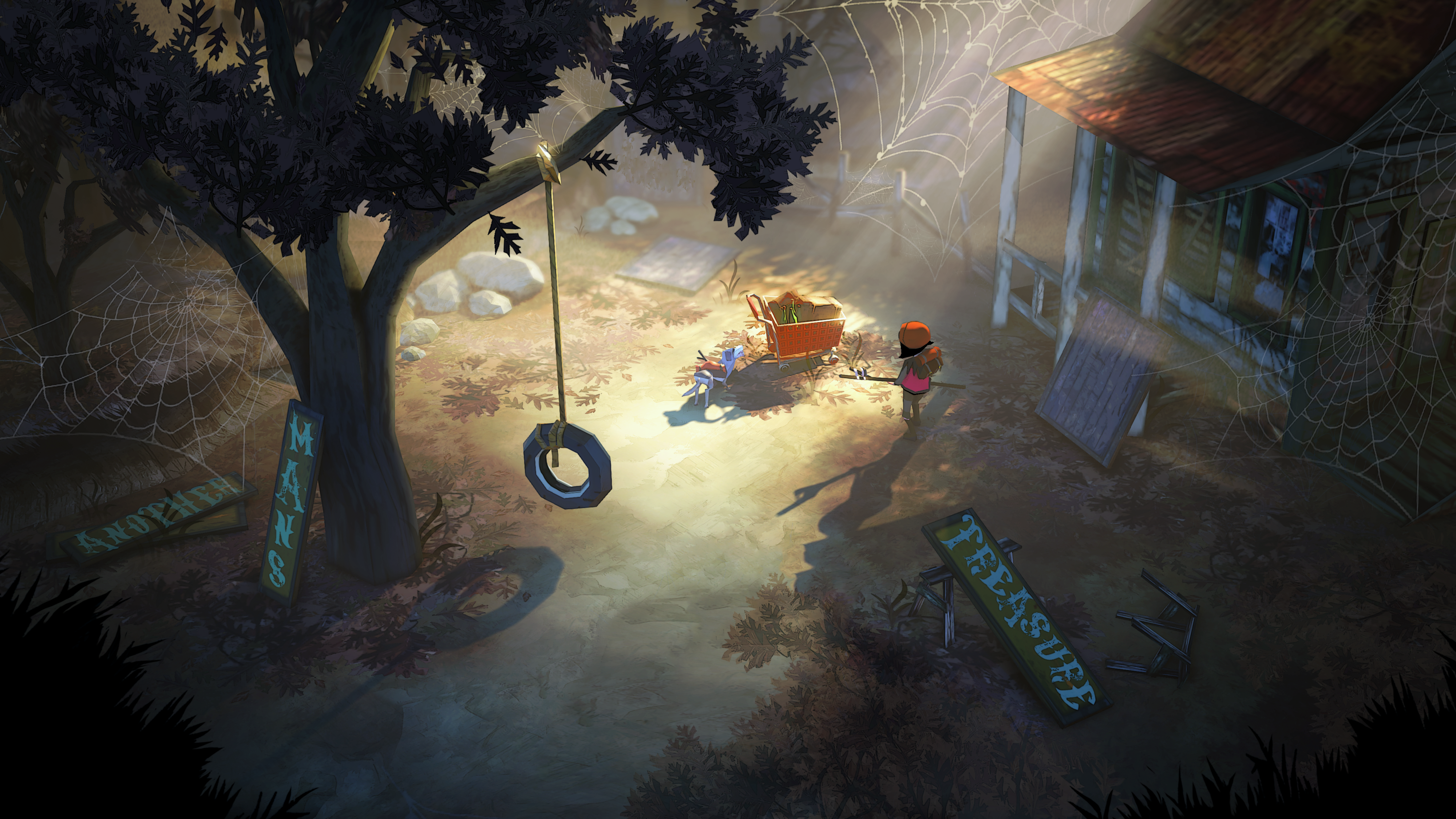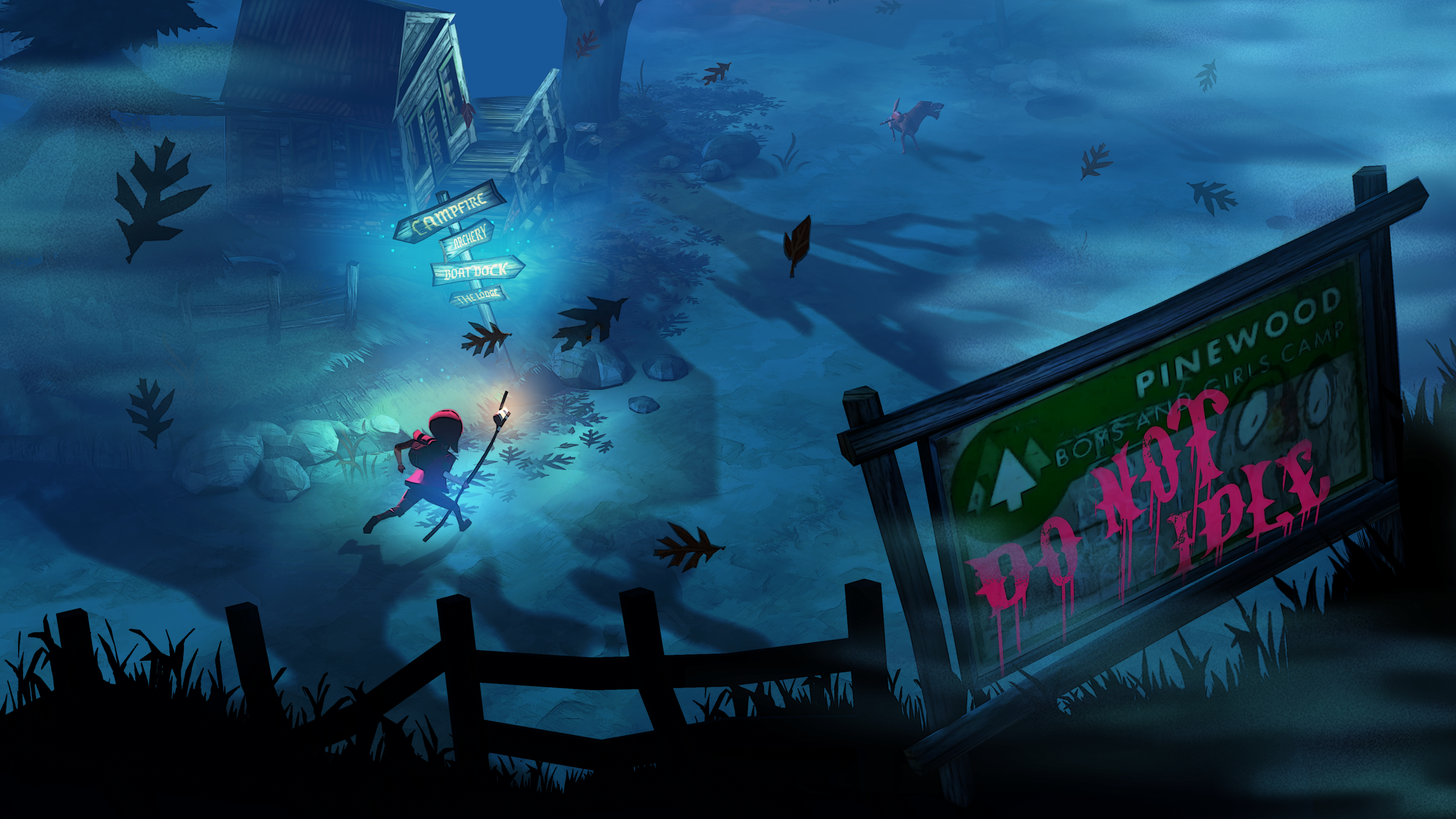In a surprise announcement, The Flame in the Flood: Complete Edition -- definitive edition to this year's Xbox One/PC indie darling -- was announced yesterday for PlayStation 4. A more "survivalist" take on the ever-growing Survival genre, The Flame in the Flood was fledgling developer The Molasses Flood's first release. DualShockers reviewed the game during its Xbox One launch, noting "The Flame in the Flood is a solid recommendation for anyone looking to diversify their catalog with a short, challenging, and artistically crafted indie title.”
After The Flame in the Flood: Complete Edition's announcement, DualShockers sat down with The Molasses Flood Co-Founder and level designer, Forrest Dowling, to talk about the upcoming port. Forrest, who previous was a lead level designer at THQ (Homefront) and Irrational Games (Bioshock Infinite) went indie following Irrational's shuttering. We discussed about his decision to go indie, improvements players can hope to see in The Flame in the Flood: Complete Edition and more.
The Flame in the Flood: Complete Edition launches on PlayStation 4 this upcoming January.
DualShockers: This is relatively short notice – we didn't know we'd be getting this announcement.
Forrest Dowling: [Laugh] Yeah, it's coming in hot for sure.
DS: We have the PlayStation 4 port coming out for The Flame in the Flood – one of the first things that struck me when I saw the press release was that there will be gameplay enhancements. Mind elaborating on what those may be?
FD: What that's referring to is – compared to the original release on the original release – we had a few patches along the way with various fixes and tuning changes and whatnot. So the PS4 version will be at full parity to the current balance and tuning and whatnot with the releases on PC and Xbox One.
DS: Perfect. I remember that being one of the--perhaps the only criticism of The Flame in the Flood on DualShockers was there was a few technical blips at launch. It's great to hear that it will come at full parity.
Now, what was your inspiration for The Flame in the Flood?
FD: It started from a couple places. Let's see… initially when we started working on it, I was really interested as a designer in just working on a pared-down survival game. Meaning, of course, on that is actually about wilderness survival as an actual thing that people do as opposed to survival as a supporting element to a zombie situation or something like that.
I was really interested in doing that initially and then Sinclair, our director, in our very earliest conversations was interested in doing a project that explored the idea of, what he called, "tiny worlds." The idea of which is a small little space that you explore through an overhead perspective with a character that you drive around.
These ideas kind of merged together and snowballed into what The Flame and the Flood became over the course of a number of months brainstorming different ideas and approaches and whatnot. But it sort of started from those two points and developed into the game we ended up with.
[pullquote]
...no wilderness survival expert if you're lost in the woods will recommend that what you should start doing is farming potatoes.
[/pullquote]
DS: Yeah, because survival elements are very much the new flavor in the gaming industry – or at least when The Flame in the Flood came out, it seemed like that was springing up everywhere in game design, Interestingly enough though, The Flame in the Flood is the only game of them that I played where it feels like you were on an adventure all the way through, compare to just surviving.
FD: Well one thing that I was really interested in was just researching survival and reading survival guides and whatnot. The paradigm that seems to exist in existing survival games is you're building a farm. [Laughs]
Y'know, you are making a little homestead and no wilderness survival expert if you're lost in the woods will recommend that what you should start doing is farming potatoes. They are going to say follow the water, get downhill, try to get back to civilization, just keep on moving – don't stay still longer than you have to. So, for me, that was really one of the initial core tenants was that this is going to be a survival game that was about movement – that was about always pushing forward . So that's why it kind of feels that way. My hope was that it would feel a little bit different from the other ones out there.
DS: Now, if I am correct on my pedigree here, you came from Irrational before going indie?
FD: That is correct!
DS: Why the move? I suppose Irrational went under for a fair amount of employees—
FD: [Laughs] – yeah, well that was certainly a part of it.
DS: --but I'm sure there are plenty of developers and publishers that who would love having Bioshock cred on their team. Why go indie?
FD: I think there are a lot of different reasons. One – the tools seemed accessible enough; the timing was great to find something different. I had an opportunity with the closing of Irrational to get a bunch of people together – there was now a whole lot of talented people in Boston, and not really a lot of work to be had. So pretty much everybody was interviewing at places all around the country. And, for me, I saw that as a chance to convince people to come on board and stay in the area and work together on something.
And then, you know, there is a whole lot of interest in a change of pace. I'm pretty sure all of us had done AAA stuff for quite a while. It was sneaking up on ten years of being a level designer on multi-million dollar budget shooters and I just wanted to try my hand at something different. Just because I had done one thing long enough that it was starting to result in a little less learning or a little less discovery along the way. I think there is a lot of different reasons.
DS: And how is the atmosphere on your end, now that you are an indie developer? I hear from mainly two camps of developers – ones who are worrying themselves constantly over their game, and those who taking it at a relaxed headspace, one day at a time.
FD: I mean, I think the stresses are different in many ways. In some ways the stress is lower for me now just because – working on a project like Bioshock, particularly towards the end when fewer-and-fewer people are working on it, as you are finalizing things, you really feel the weight of all the jobs of your co-workers on your shoulders. The weight of the tens-of-millions of dollars that have been invested in the project, so on and so forth. You really feel the pressure of all the people around you, relying on you.
Whereas now, we are just a small collective, basically, and the stakes are high for us individually but they don't really spiral outwards and affect lots and lots of other people around us ranging from 100 coworkers to a whole hierarchy above us to investors and all the other people who put faith in you. I don't know… in some ways it's a little more relaxing, but also [laughs] you are fully responsible for your own paycheck. It's up to you to make sure another one comes in a way that is not nearly as assured or comforting as working in a big studio.
[pullquote]
in some ways it's a little more relaxing, but also you are fully responsible for your own paycheck.
[/pullquote]
DS: Let's go back to The Flame in the Flood for a little bit – DualShockers covered it and we loved the game, we recommended it very highly. We saw other critics reviews and it seemed like it went off great. How has the team been seeing the reception on your end either critically or with your fan-base? Has it been exactly what you guys wanted?
FD: Obviously I would have loved for it to have been an absolute critical darling, and for everyone to have been like, "Well of course, this is the game of the year." [Laughs] And that's not the case, but the reception we got is totally fine too. As a studio, The Flame in the Flood was our first title and I've been very happy with the reception of it.
We have found that it is definitely not a game for absolutely everyone. The fact that it is not really a combat-oriented game and is a slower-paced game in many ways turned some folks off, which is fine. That is one of the great things of working on a smaller project – you can work on something that has maybe more of a niche appeal or point of view, and you don't need to worry so much about absolutely everyone who might buy a video game.
But yeah, I think we've been really happy . Game reviews are really strong for it overall. Critical feedback has been really great. I think it's about as good as I could have reasonably hoped for.
DS: Now as someone so ingrained in the game, do you find yourself going through every single review? Or even every single Steam review?
FD: I mean, I've certainly read every published review of it that I came across and even Google Translate-d some in other languages just to try and get the jist of what they are talking about. Y'know, I can totally understand someone after reading a couple of dozen reviews, someone kind of skimming the remainder of them just because the key points tend to circle around the same things.
And I think I read most our Steam review although they keep rolling in. It never ends there. I read everything for a while and now I just pop over to reviews maybe once a week or so to see what everyone is saying. I'm looking at it right now and I see a page full of blue thumbs-up and one little thumbs down so it's looking good.
DS: So when I played through The Flame in the Flood one of the most striking things I noticed – and it's definitely one of the most advertised – was the soundtrack. So has having a strong soundtrack always been part of your game design philosophy? Can we expect that in future Molasses Flood titles?
FD: I think we knew the music was going to be really important for this project. I wouldn't be able to say absolutely for sure if a future project that would be the case – we might take a different approach. But it really seemed to fit, and that was part of our early concepting. One of the things that we do tend to do is look for all sorts of cultural reference from the sort of thing that we want to do. So in the case of The Flame in the Flood we were looking at a lot of photography and survival books, reading about the various river journeys and whatnot and had a playlist on Spotify of southern, country folk-themed music.
[pullquote]
One of the things that we do tend to do is look for all sorts of cultural reference from the sort of thing that we want to do.
[/pullquote]
And it did seem, early on in this project, that it was going to be a big part of the environment and the vibrant part of the world we wanted to depict. And it became extra significant as well because we had the opportunity to work with Chuck who is an old friend of Scott Sinclair, our Director, so we have a personal connection with somebody whose music was a perfect fit for the game and who immediately loved the sorts of themes that we were working with and environments we were working with.
DS: Speaking of future projects very loosely, what is Molasses Flood looking to do in the near future? Are we going to see any kind of expansion in The Flame in the Flood's universe or are you guys going for something totally different?
FD: I expect we are going for something different, but it's pretty early days for that right now. There's a lot of stuff up in the air and we're trying to figure out what's next but it's definitely way too early to talk about any specifics because it's still a lot of ideas up in the air.
DS: Final question – what games are you currently playing?
FD: Oh god… I'm playing a lot of stuff. Let's see… my go to recently has been Overwatch, I just kind of keep going back to that. I've been playing Battlefield 1, just played through Titanfall 2, just started Watch_Dogs 2.
I actually just picked up Homefront: The Revolution on a Steam sale, which I know was pretty panned and whatnot but in a past life I worked on the original Homefront for a number of years so it's kind of interesting to see what somebody else – a whole new team – was doing with the world and fantasy that we originally created. Which is kind of an interesting thing to look at, for sure.

